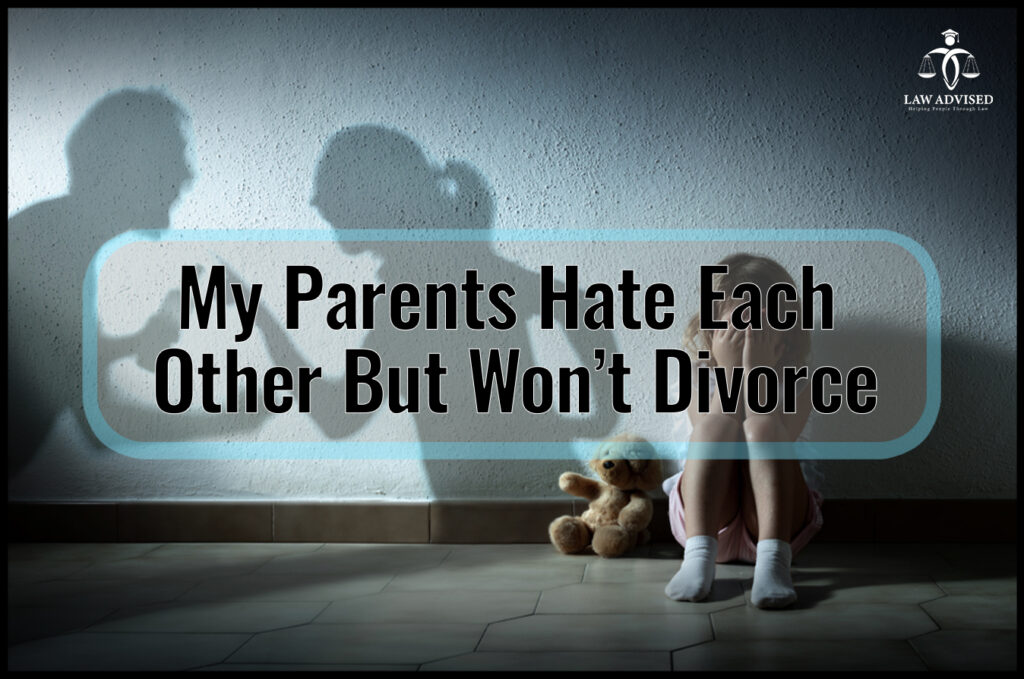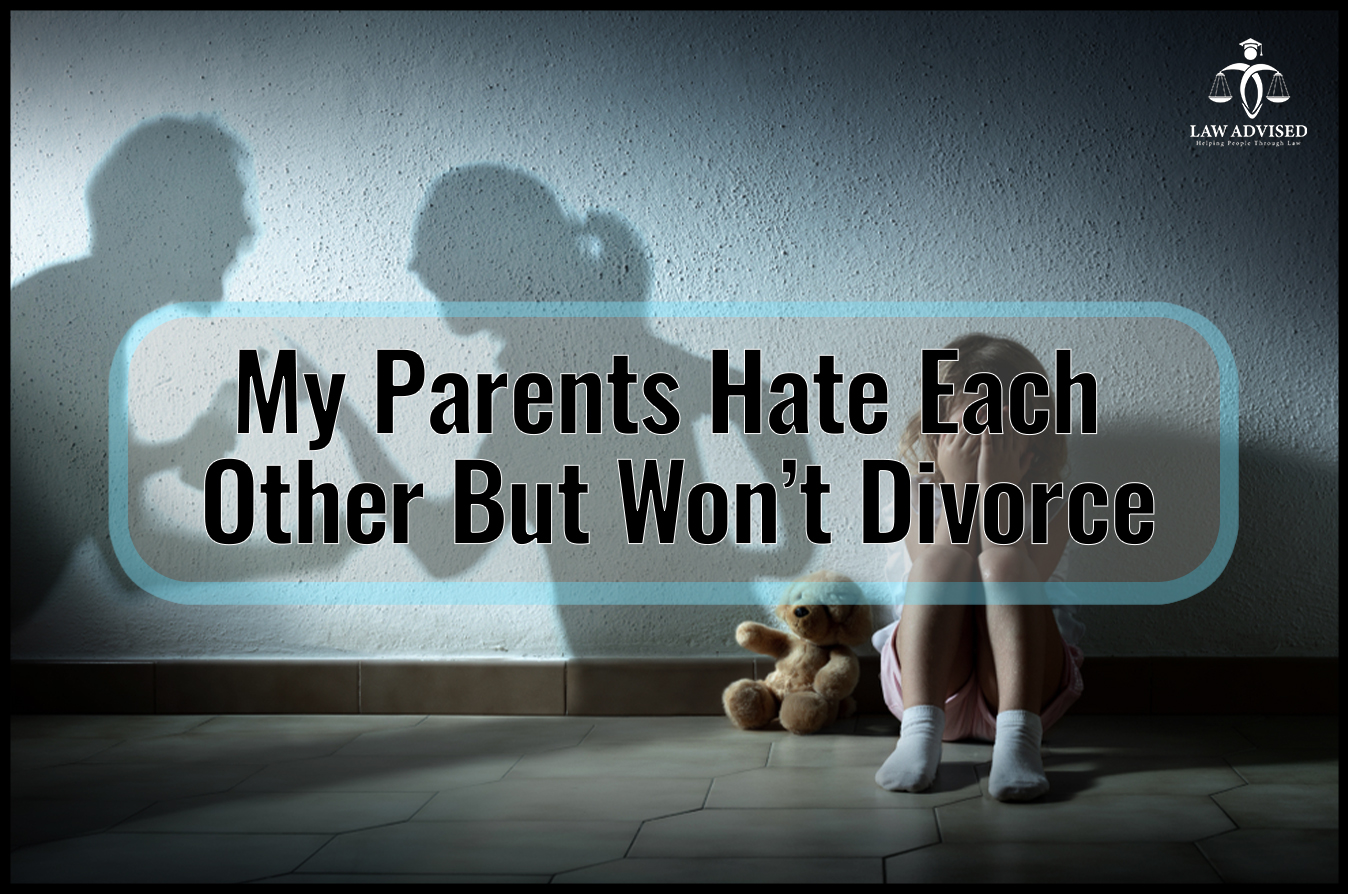My parents refused to divorce despite their mutual hatred for each other. Are you stuck in a situation where your parents can’t stand each other but won’t consider a divorce?
It can be difficult and confusing to witness your parents’ unhappiness while they choose to stay married. We will explore why some couples stay together even when they despise each other, the potential impact on the family, and possible solutions to improve the situation.
Understanding this complex dynamic can help you navigate your emotions and relationships in a more empathetic and constructive way. Let’s delve into the reasons behind their decision to stay together and examine the possible long-term effects on all family members involved.
The Silent Suffering: Unraveling The Dynamics Of An Unhappy Marriage
Living in an unhappy marriage can be incredibly challenging, not just for the couple involved, but also for their children. Children subjected to their parents’ constant conflict may experience emotional distress, leading to long-lasting scars that affect their well-being and future relationships. It is essential to identify and acknowledge this emotional turmoil, providing the necessary support for children to cope and heal.
Growing up in a hostile environment where parents harbor resentment and animosity towards each other can negatively impact children. The constant tension and conflict can leave children feeling anxious, stressed, and uncertain about their future relationships. They may struggle with trust issues and have difficulty forming healthy emotional connections. Furthermore, witnessing their parents’ unhappiness may normalize toxic behavior patterns, which they might inadvertently replicate in their relationships later in life. It becomes crucial to break this cycle and provide children with a foundation of love and stability.
Despite the evident dissonance and unhappiness, some parents choose to stay together for various reasons. These reasons can include financial concerns, religious beliefs, fear of societal judgment, or the hope that things might improve over time. While their motivations are subjective, it is important to recognize that staying in an unhappy marriage can ultimately have detrimental effects on both the parents and their children.
Unveiling The Underlying Causes: Navigating The Source Of Conflict
Identifying common reasons why parents may hate each other involves exploring the psychological and emotional factors contributing to animosity. In many cases, unaddressed resentment and unresolved issues play a significant role in perpetuating the tension.
It is crucial to recognize that various psychological factors can contribute to the hostility between parents. Issues like ego, past traumas, and conflicting personalities can intensify the animosity. Additionally, when couples fail to confront and resolve their ongoing disputes, the resentment tends to grow over time. As a result, the initial causes of their dislike can become obscured, leaving them trapped in a cycle of hate.
Resolving the underlying issues requires honest communication and professional intervention if necessary. By acknowledging and addressing the root causes, parents can work towards healing their relationship for the sake of their children’s well-being.
Breaking Free From The Vicious Cycle: Strategies For Restoring Harmony
Encouraging open communication: Creating a safe space for open dialogue can help parents understand each other’s perspectives and foster empathy. Encourage them to express their feelings without judgment, and actively listen to each other’s concerns. Emphasize the importance of effective communication techniques, such as using “I” statements and active listening, to avoid escalating conflicts.
Seeking professional help: Therapy and counseling can offer invaluable support by providing a neutral environment and professional guidance. A trained therapist can help parents identify the roots of their conflicts, develop coping strategies, and improve their communication skills. Additionally, therapy can provide a platform for both parties to express their emotions and frustrations constructively.
Implementing conflict resolution techniques: Introducing conflict resolution techniques can aid in finding common ground and promoting compromise. Techniques such as active problem-solving, negotiation, and seeking mutually beneficial solutions can help parents break the cycle of animosity and work towards restoring harmony. Encouraging parents to practice empathy and consider the impact of their actions on their children can also facilitate healthier interactions.
Finding Solace In Your Emotional Well-being
Acknowledging and processing your feelings about your parents’ unhappy marriage is essential for your emotional well-being. It is important to recognize that their relationship struggles are not a reflection of your worth or value as an individual. You might experience a range of emotions such as sadness, anger, confusion, or even guilt.
Developing healthy coping mechanisms and self-care practices can help you navigate these emotions. Engaging in activities that bring you joy and fulfillment, such as hobbies or spending time with loved ones, can provide a sense of comfort and stability. Prioritizing self-care, whether it’s through exercise, meditation, or seeking therapy, can also help you manage the emotional toll of your parent’s situation.
Establishing boundaries to protect your own mental and emotional health is crucial. This may involve limiting your involvement in their conflicts, setting clear expectations for how you want to be treated, and communicating your needs effectively. It’s important to remember that you cannot control their actions or decisions, but you can take control of your well-being.
Cultivating Positive Relationships Outside The Family Unit
Cultivating positive relationships outside the family unit can be a valuable source of support, especially when dealing with parental conflicts. Nurturing relationships with supportive friends and mentors is important for emotional well-being. Seeking guidance and advice from trusted adults or family members can provide a fresh perspective and valuable insights into navigating the challenges of a strained parental relationship.
Engaging in extracurricular activities and pursuing personal passions can broaden horizons, provide a healthy outlet for emotions, and foster a sense of independence and self-confidence. These activities can also serve as opportunities to meet new people and forge meaningful connections.

Education And Empathy: Understanding The Complexity Of Relationships
Developing empathy and compassion for your parents’ struggles is an important step in understanding their situation. By putting yourself in their shoes, you can gain insight into the underlying dynamics of their relationship. Their unhappiness with one another does not necessarily reflect their ability to form fulfilling relationships. It is essential to recognize that every relationship is unique and multifaceted, and sometimes couples choose to stay together for various reasons beyond traditional happiness.
Learning about healthy relationship dynamics and communication can provide you with the tools to navigate your future relationships effectively. By gaining knowledge about effective communication, conflict resolution, and personal boundaries, you can build stronger connections with others and establish healthier relationship patterns. Remember that your parents’ situation is not a reflection of your potential for happiness and fulfillment.
Ultimately, focusing on your personal growth and establishing your boundaries and values will contribute to your overall well-being. By developing empathy, understanding, and strong personal relationships, you can create a fulfilling life for yourself regardless of your parents’ relationship status.
Reinventing The Relationship: Rebuilding Trust And Connection
Approaching the possibility of reconciliation with caution and realistic expectations
Rebuilding trust is essential in a relationship marred by animosity. This can be achieved through honesty, forgiveness, and consistent effort. Open communication is key – both parents must express their feelings and concerns honestly, without judgment. Their past conflicts and grievances may require professional intervention, such as family therapy, to address deep-rooted issues and foster healing.
Family therapy provides a safe space for addressing underlying problems and facilitating open dialogue. A trained therapist can guide the process and assist in finding common ground. Parents must understand that rebuilding trust takes time, effort, and mutual commitment. Gradual progress should be celebrated while remaining cautious of unrealistic expectations.
Embracing Personal Growth: Flourishing Amid Adversity
Embracing Personal Growth: Flourishing amid Adversity
The transformative power of individual self-improvement lies in its ability to inspire change and foster personal development. In families where parents harbor resentment towards one another but refuse to divorce, embracing personal growth becomes more crucial than ever. Rather than succumbing to the negativity and bitterness that often permeate such households, individuals can choose to embark on their journey of self-improvement.
This journey involves introspection, self-reflection, and a commitment to personal happiness. By prioritizing their well-being, individuals can break free from the toxicity that plagues their parents’ relationship.
Encouraging personal growth within the family unit can also have a significant impact. By fostering an environment that embraces change and new opportunities for happiness and fulfillment, families can collectively heal and grow stronger. This may involve promoting open communication, encouraging individual pursuits, and fostering a sense of acceptance and love within the family dynamic.
Ultimately, personal growth offers the chance to rise above the adversity and negativity that exist when parents are trapped in a loveless marriage. By forging our path towards self-improvement, we can create a better future, not just for ourselves, but for our families as well.
Redefining Family Dynamics: Embracing Unconventional Paths To Happiness
In today’s society, it’s not uncommon for couples to find themselves in situations where their love has faded and their relationship has become toxic. Many couples would naturally consider divorce as the only solution, but what if they decide to stay together despite their unhappiness? This is the reality for some families, including mine. My parents hate each other, but won’t divorce.
Instead of opting for separation or divorce, some couples, like my parents, choose to navigate their co-parenting relationship with respect and cooperation. This involves setting aside their differences and focusing on what’s best for the children. It requires effective communication, compromise, and a willingness to put the children’s needs above their own. While it may not be the conventional path to happiness, it is possible to find contentment in this arrangement.
Furthermore, redefining family dynamics means embracing new definitions of what it means to be a family. It’s no longer confined to the traditional structure of a married couple and biological children. Families can include step-parents, half-siblings, and even close friends who play important roles in a child’s life. Happiness can be found in these non-traditional structures, as long as love, respect, and support are present.
So, if you find yourself in a similar situation with parents who hate each other but won’t divorce, know that there are alternative paths to happiness and stability. It requires open-mindedness, a commitment to co-parenting, and a willingness to redefine what family means to you.
Frequently Asked Questions Of My Parents Hate Each Other But Won’t Divorce
Why Do Some Parents Stay Together Despite Hating Each Other?
While every situation is unique, some parents may choose to stay together for the sake of their children’s well-being.
What Are The Effects Of Parents Hating Each Other But Not Divorcing?
Children may experience emotional distress, anxiety, and unstable relationships as a result of their parents’ unhappy marriage.
Can Parents Successfully Co-Parent Even If They Can’t Stand Each Other?
Yes, with effective communication, boundaries, and a focus on the child’s needs, parents can co-parent successfully despite their differences.
How Can Children Cope With Their Parents’ Conflict Without Divorce?
Children can benefit from therapy, open communication, and having a support system outside of their family to navigate their parents’ conflict.
Can Staying In An Unhappy Marriage For The Children Do More Harm Than Good?
While the intention may be noble, staying in an unhappy marriage can potentially do more harm than good for both parents and children in the long run.
What Are Some Alternative Options For Parents Who Don’t Want To Divorce?
Parents can consider seeking marriage counseling, mediation, or exploring ways to improve their relationship through open and honest communication.
How Can Parents Prioritize Their Children’s Well-being Amidst Their Conflicts?
By putting their differences aside, focusing on co-parenting, and maintaining a civil relationship, parents can prioritize their children’s well-being.
Is It Possible For Parents To Rebuild Their Relationship Despite Hating Each Other?
With dedication, effort, and professional help, some parents can rebuild their relationship and create a healthier environment for their family.
Conclusion
Amid parental disharmony, it can be difficult to navigate the complexities of a relationship that seems destined for failure. Although their hatred may be evident, it is important to remember that every family’s situation is unique. Instead of letting their lingering emotions dictate the course of their lives, seeking professional guidance and support can provide clarity and help foster a healthier coexistence.
Remember, forgiveness and empathy hold the power to heal even the deepest wounds. Embrace the opportunity for personal growth and strive towards finding peace amidst adversity.
Ismail Hossain is the founder of Law Advised. He is an Divorce, Separation, marriage lawyer. Follow him.





Leave a Reply